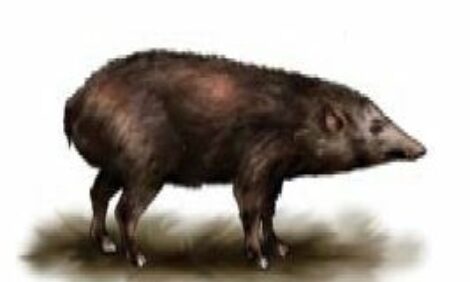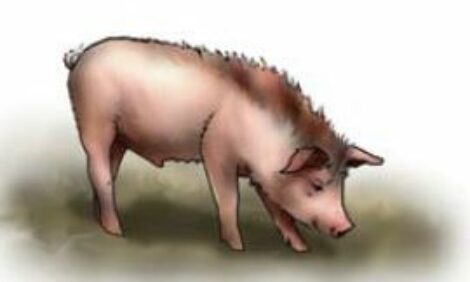



Mukota
Mukota is a breed of indigenous, domestic pig found primarily in Zimbabwe. It is also known as the Rhodesian Indigenous or Zimbabwe Indigenous pig.
Mukota pigs are black, hardy in the tropics, resistant to disease and poor nutrition, and require little water (as little as 6 litres per week). It has an enlarged caecum were elaborate hind-gut fermentation occurs making it able to thrive on high fibrous diets compared to other pig breeds. Mukota pigs can easily survive under very unhygienic conditions, a testiment to their high disease resistance. Mukota fall into two broad classes; one is short and fat, with a short snout resembling that of the Chinese Lard pig. The other resembles the Windsnyer (Wind cutter), with long snout and razorback. They are, however, both black in colour without any shades or spots. The latter class predominates in Zimbabwe and is also found in some parts of Mozambique and Zambia. There are about 70,000 Mukota pigs in Zimbabwe. These indigenous Zimbabwean pigs show moderate parasite tolerance, greater than the imported or western varieties. Zimbabwe's indigenous Mukota pigs are known to be less prone than imported varieties to internal parasites within commercial agriculture.
Mukota are found primarily in Zimbabwe (with an estimated 70,000 pigs), but also in Mozambique and Zambia. They are believed to have been introduced in the 17th century Europe and China trade (Bonsma and Joubert, 1952. Mukota are named after the Mukota region of north-eastern Zimbabwe where they were first studied in detail. Reproduction follows an annual rhythm with peak farrowing in the early rainy season (October/November). Mating is uncontrolled during this period, as many Mukota are free ranging during this time of the year. The age at first litter ranges from 6 to 12 months, with average litter size is between 6.5 and 7.5. The total weight of litter as a proportion of the sow weight is of the same order (i.e. 11 %) as for Large White or Landrace, and so the Mukota does have scope for improvement through selective breeding. Possibilities being considered at the moment involve divergent selection using a potentially small fat Mukota dam (well adapted to harsh conditions) crossed with a large lean sire to produce slaughter generation. This will allow exploitation of hybrid vigour and produce an efficient growing pig reared from a hardy mother subsisting in a constrained environment. Carcass yield at the moment is about 30% less than from the exotic Large White pig, but is considered to be very high quality meat.








